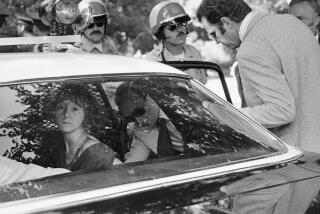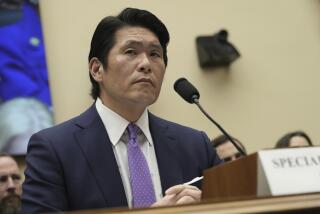Bitter Lament by Foster Revealed Depth of Despair : Suicide: In a torn note, Clinton aide deplored life in Washington, where âruining people is considered sport.â
WASHINGTON â Deputy White House Counsel Vincent Foster, who committed suicide July 20, left behind a ripped-up note saying that he âwas not meant for the job or the spotlight of public life in Washington,â federal law enforcement officials said Tuesday.
âHere, ruining people is considered sport,â Foster said in the note, which was discovered torn into more than two dozen pieces in the bottom of his briefcase. The noteâs existence has been known since shortly after its discovery but what Foster had written was not disclosed until Tuesday.
The note probably stemmed from a suggestion by Fosterâs wife Lisa, who had urged him to write down what was troubling him in an effort âto vent,â said Robert E. Langston, chief of the U.S. Park Police, which officially headed the investigation into Fosterâs death. Although officials have always referred to Fosterâs death as a suicide, law enforcement agencies waited until their investigation was complete before officially concluding that he had died by his own hand.
At a Justice Department briefing Tuesday, Deputy Atty. Gen. Philip B. Heymann, who coordinated the investigation, said he wanted to assure âthat no stone was left unturnedâ and has directed two Justice Department units to investigate allegations that Foster made in his anguished note.
The allegations ranged from, âThe FBI lied in their report to the AG (attorney general),â presumably about an investigation of the White House travel office in which Foster was involved, to a plot by housekeeping managers at the White House to inflate the costs of a redecorating job.
The note also accused members of the press of âcovering up the illegal benefits they received from the travel staff,â the Republican Party of lying and misrepresenting its knowledge of and role in a prior investigation, presumably of the travel office, and Wall Street Journal editors of lying âwithout consequence.â
Foster was peripherally involved in the scandal surrounding the May firings of seven longtime employees of the White House travel office, which also often arranged travel for news media reporters covering the President.
The White House initially claimed that the workers were guilty of âgross mismanagementâ of funds, but later could not back up the claim. Fosterâs chief role appeared to be to keep First Lady Hillary Rodham Clinton informed of developments in the case.
The Wall Street Journal reference almost certainly stemmed from a series of editorials critical of Fosterâs legal work on behalf of the White House. The editorials also raised questions about the relationship among four former members of Little Rockâs Rose Law Firm: Foster, Mrs. Clinton, Associate White House Counsel William Kennedy and Associate Atty. Gen. Webster Hubbell.
âThe public will never believe the innocence of the Clintons and their loyal staff,â Foster said in the note, which police said an aide to White House Counsel Bernard Nussbaum found when making an inventory of Fosterâs office.
âI made mistakes from ignorance, inexperience and overwork,â Foster wrote in the unsigned note, which had been torn into 27 or 28 pieces. âI did not knowingly violate any law or standard of conduct.
âNo one in the White House, to my knowledge, violated any law or standard of conduct, including any action in the travel office. There was no intent to benefit any individual or specific group.â
Fosterâs body was found at Ft. Marcy National Park, across the Potomac River from Washington. Langston of the Park Police listed several reasons Tuesday why investigators concluded the gunshot was self-inflicted.
âThe condition of the scene, the medical examinerâs findings and the information gathered clearly indicate that Mr. Foster committed suicide,â Langston said. Fosterâs body was found with a 1912 Army Colt revolver still in his hand, and the autopsy concluded that he died of a single gunshot that entered his mouth.
âWithout an eyewitness, the conclusion of suicide is deduced after a review of the injury, the presence of the weapon, the existence of some indicators of a reason and the elimination of murder,â Langston said.
Noting there was no evidence of foul play, Langston said that âinformation gathered from associates, relatives and friends provide us with enough evidence to conclude that Mr. Foster was anxious about his work and he was distressed to the degree that he took his own life.â
Maj. Robert A. Hines of the Park Police said that the investigation had determined that Foster had been taking Trazodone, an antidepressant drug prescribed for him by an Arkansas physician who had examined him. None of the drug was found in his body.
Investigators also addressed a number of questions raised by the White House actions after Fosterâs death, including why the White House used executive privilege after the death to block law enforcement investigators from searching Fosterâs office.
Nussbaum conducted that search, while Park Police, FBI agents and Justice Department attorneys were permitted only to look on.
Park Police expressed concern to the Justice Department about the White House decision, Langston said. The department then raised those concerns with the White House and at that point, âWhite House staff became very compliant and everything that we had asked for they provided to us fully,â Langston said.
White House Communications Director Mark D. Gearan said that a reference in Fosterâs note to the âusherâs officeâ related to discrepancies in cost estimates for redecorating several rooms in the White House. The note alleged that the âUshers Office plotted to have excessive costs incurred, taking advantage of Kaki and HRC,â a reference to Mrs. Clinton and a Little Rock friend and interior designer, Katherine (Kaki) Hockersmith, who was hired by the First Lady to supervise the work.
The White House usher, Gary Walters, is responsible for upkeep of public and private rooms in the White House and is working with Hockersmith on the renovations, which are being paid for with donated private funds.
In March, Hockersmith and Walters estimated that renovations of the Oval Office, Treaty Room and several other parts of the residence would cost $250,000. By June, the figure had escalated to $377,000. That figure apparently was reported to Foster, who handled most of the White House legal work involving Mrs. Clinton, his former law partner.
Gearan said that Foster appeared to be concerned about that discrepancy. But an initial Justice Department inquiry found no evidence of any plot by Walters to inflate the renovation costs to embarrass the First Lady, Gearan said.
Heymann said that, while the investigation âis not totally complete, I am told that based on its interviews to date nothing has led the Public Integrity Section to suspect any criminal conduct that would then have to be investigated.â
Nor has the White House found any evidence to support Fosterâs contention that the press received âillegal benefitsâ from the travel office staff, Gearan said. Further, the aide said, âwe have no reason to believeâ the FBI lied to the attorney general in its report on the travel office scandal, despite Fosterâs assertion.
The spokesman declined to term Fosterâs letter a suicide note. âI think it is viewed as a note of (a man) who was troubled by matters at work; that indeed, itâs a sad commentary in many ways on life in Washington, and itâs, frankly, given many of us pause for thought, particularly the reference that Vince makes at the close of his writing.â
âI was not meant for the job or the spotlight of public life in Washington. Here ruining people is considered sport,â Foster concluded.
More to Read
Sign up for Essential California
The most important California stories and recommendations in your inbox every morning.
You may occasionally receive promotional content from the Los Angeles Times.










